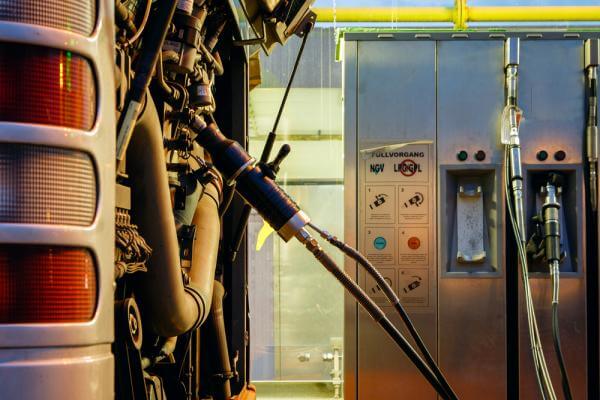CNG Fuels and National Grid unveil the UK’s first high-pressure grid connected compressed natural gas (CNG) filling station, off junction 28 of the M6, near Leyland, Lancashire
CNG Fuels, in partnership with National Grid, has unveiled a new state-of-the-art filling station in Leyland, Lancashire, allowing vehicles to fill up on compressed natural gas (CNG), directly from the high-pressure local transmission system.
The unveiling saw the first major customer, Waitrose, part of the John Lewis Partnership, fill up at the new facility, as a fleet of branded HGVs rolled onto the forecourt.
The new facility is the first of its kind in the UK and boasts a high-pressure connection, delivered by National Grid. This key piece of transport infrastructure is capable of refuelling more than five hundred HGVs per day.
Located near to junction 28 on the M6, the CNG filling station will be accessible around the clock, 365 days a year. The facility also supplies 100% renewable biomethane (Bio-CNG) and is an important part of the UK’s rapidly growing CNG refuelling infrastructure. The biomethane is made from waste at anaerobic digestion plants and delivered to the filling station through the National Grid pipeline system.
Waitrose has a regional distribution centre less than one mile from the new CNG filling station and will be its anchor customer.
Philip Fjeld, director at CNG Fuels, said: ‘Even though the price of diesel and petrol has recently plummeted, the wholesale price of natural gas has also dropped, and our customers can still enjoy a pump price of CNG at our Leyland station that is more than 30% cheaper than the equivalent price of one litre of diesel.
‘Using natural gas also cuts CO2 emissions by more than 20% and if fleets choose to fuel their trucks with Bio-CNG, they will be running on 100% renewable gas.’
National Grid’s network strategy director, David Parkin, said: ‘Today’s launch is a proud moment for National Grid and its partners. Located just off junction 28 of the M6, this new facility is ideally located for the transport sector and we expect it to be extremely popular.
‘CNG dispensed from a station connected to the local transmission system, is the cheapest fuel available to HGVs, as well as having the lowest well-to-wheel emissions of any fossil-based HGV fuel.
‘Whether it’s CNG or Bio-CNG, the benefits for HGVs are clear; lower emissions, quieter engine noise and competitive fuel prices, compared with traditional liquid fuels.’
Justin Laney, central transport general manager for the John Lewis Partnership, added:
‘John Lewis Partnership is committed to running a sustainable logistics operation, and the use of low carbon fuels in our vehicle fleet is a key element of that. Our strategy is to displace diesel with bio-methane where practical, and we run one of the largest alternatively fuelled heavy truck fleets in the UK to enable us to do that. This filling station is an important step that will help us continue to improve our fleet sustainability.’

































